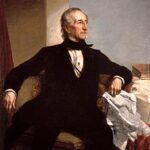John Tyler’s presidency began with promise but quickly descended into political chaos. The Tyler Whig Party conflict erupted just months after he assumed office following William Henry Harrison’s death.
The Breaking Point
Tyler’s repeated vetoes of key Whig legislation shocked party leaders. ⚠️ The National Bank bill veto in August 1841 marked the point of no return. Whig leaders had expected Tyler to support their economic agenda. Instead, he followed his strict constitutional interpretation. This decision defied party expectations and campaign promises.
Formal Expulsion Process
On September 13, 1841, the Whig Party officially expelled Tyler from their ranks. 📊 This unprecedented action left Tyler as a president without party support. No American president had ever faced such complete political isolation. The expulsion resolution passed with overwhelming Whig support in Congress. Party newspapers across the nation condemned Tyler’s “betrayal” of Whig principles.
Constitutional Crisis Emerges
Tyler’s expulsion raised serious questions about democratic governance. 💰 Could a president effectively govern without party backing? The Constitution provided no guidance for this unprecedented situation. Tyler’s cabinet resigned en masse, except for Secretary of State Daniel Webster. This created additional administrative challenges for the isolated president.
Impact:
The Tyler Whig Party expulsion fundamentally altered American political dynamics and presidential power. This unprecedented situation created lasting consequences for the presidency and party system.
Immediate Political Paralysis
🔥 Tyler’s isolation crippled his legislative agenda for three years. Congress repeatedly overrode his vetoes with bipartisan opposition. The president became known as “His Accidency” among political opponents. Democratic opposition joined Whigs in blocking Tyler’s initiatives. This created governmental gridlock unprecedented in American history.
Constitutional Precedent Established
Tyler’s expulsion established important precedents for presidential independence. 📉 Future presidents could break with their parties without constitutional crisis. The incident proved the presidency could survive complete party abandonment. However, it also demonstrated the practical limitations of presidential power without support. Tyler’s struggle influenced later discussions about presidential authority and party loyalty.
Long-term Political Ramifications
The expulsion contributed to the eventual collapse of the Whig Party. 🌍 Tyler’s actions exposed fundamental divisions within Whig ranks. Northern and Southern Whigs disagreed on key issues like slavery expansion. Tyler’s Southern Democratic roots conflicted with Whig nationalism. This crisis accelerated the party’s disintegration by the 1850s. The incident also strengthened the concept of party discipline in American politics.
